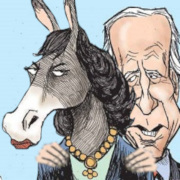|
Dreddout posted:Maybe not, but this thread is for asking questions about socialism, and I think I speak for many in this thread when I say I would prefer a two sided discussion, not a link to a Forbes article and a "Just google it! Why are you forcing me to respond to your posts?" i'll dismiss whatever bad faith posts i want. you seem earnest so there's no reason to do so with you atm. also there's way more than that one article, and that one article links to other things which would be good to read, as well!
|
|
|
|

|
| # ? Apr 29, 2024 15:33 |
|
https://www.youtube.com/watch?v=5tCMI0uKbBE haters get on my level
|
|
|
|
i can't believe i didn't put the doofus anarchoteen on ignore sooner
|
|
|
|
The idea that China today could still be called socialist is impossible for me to accept. Everything is fully marketized despite the presence of large SOEs (which are being privatized piecemeal btw), very meager social provisions, general ideological inflection toward nationalism from leftism, despite the constant name-dropping of Marxist-Leninism without discussing its meaning and implications and the opening of 'schools of marxism' where students are taught that sweat shops are socialist as hell. It is true that state sector still plays a heavy role in the economy, but you're going to have to explain to me how that necessarily cognates with 'socialist'.
|
|
|
|
I guess you could say that the CCP is accelerating the development of material conditions for socialism by emulating the historical development of capitalism, but it's not an argument I'd put much stock in.
|
|
|
|
Das Anstrengung Post Vol.II coming later today guys. The themes will be Religion, Entertainment, and Violence.
|
|
|
|
Growing the Ignore List is an act of revolutionary violence.
|
|
|
|
I've personally never used the ignore feature, and I've see shitposting like you wouldn't believe. Honestly one of the better decisions I've made. When you can look at what someone says, then list their assumptions, and why they're wrong, you never need to ignore them.
|
|
|
|
So I have come up with more questions to ask you guys! I've taken the time to read some wiki articles on Marxism. (Cause the best way to understand a 100+ year old ideology is to skim a few articles right?) But I would like some book recommendations for deeper reading. (Specifically relatively light reading, pertaining to Marx himself, a biography on the guy would be useful. Maybe a book on modern 21st century Marxist movements and thought.) With that being said onto my first question. What about religion? I come from a heavily Catholic family, and while I am personally agnostic, I feel that socialist movements have made a mistake by alienating religious people and churches in the pass. Many of the socialists I admire (Martin Luther King, Albert Einstein, Woody Guthrie) were people of faith, and I don't think having immaterial beliefs are inherently anti socialist. The state atheism of the USSR and PRC are, frankly, little better than a church dominated society. In my opinion separation of church and state is vastly preferable to the state having an opinion either way. Take America for instance, the influential folk singer Woody Guthrie never joined the communist party despite being a socialist, because the early communist society required members to renounce their faith. Capitalist's took advantage of this, and now we have poo poo like the prosperity gospel and megachurches. Despite the teachings of Jesus Christ being remarkably similar to a communist society. I understand that many religions are extremely hierarchies, (Hello, Holy See!) but most modern religions have adapted to huge changes. The Catholic Church, for instance, has survived the transition feudalism to mercantilism, and mercantilism to capitalism. I doubt it couldn't survive in a socialist world. Hell, the more religious member of my family has become a noticeably more liberal since Pope Francis was elected My primary question is, in a socialist society would religious freedom exist, and be protected? Would religious people be persecuted, because I don't think religions going away, and it can only hurt socialists to alienate the central facet of many members of Humanity. https://www.youtube.com/watch?v=EDS00Pnhkqk Namaste, YCS Dreddout fucked around with this message at 05:35 on Mar 5, 2016 |
|
|
|
One thing that I am sure someone will tell me I am wrong about that may be of interest: the "opiate of the masses" phrase is rather misunderstood. The easy knee-jerk interpretation is that it's about how religion deludes people and keeps them pacified and therefore must be overthrown, etc. But that doesn't seem especially true to the source. Let's look at it in full:quote:The foundation of irreligious criticism is: Man makes religion, religion does not make man. Religion is, indeed, the self-consciousness and self-esteem of man who has either not yet won through to himself, or has already lost himself again. But man is no abstract being squatting outside the world. Man is the world of man – state, society. This state and this society produce religion, which is an inverted consciousness of the world, because they are an inverted world. Religion is the general theory of this world, its encyclopaedic compendium, its logic in popular form, its spiritual point d’honneur, its enthusiasm, its moral sanction, its solemn complement, and its universal basis of consolation and justification. It is the fantastic realization of the human essence since the human essence has not acquired any true reality. The struggle against religion is, therefore, indirectly the struggle against that world whose spiritual aroma is religion. The element of religion as a repressive delusion is there, but the overall point is a bit more complex and nuanced. First, this comes from "A Contribution to the Critique of Hegel’s Philosophy of Right." Marx took Hegel's dialectic, which was a spiritual and idealistic concept, and turned it upside down, making it not about ideas so much as material forces in reality. So that first paragraph seems to heavily reference this idea: religion is in the same realm as the idealistic, spiritual, the "inverted consciousness." (Honestly I'm a little fuzzy on this part.) Second, look at the buildup in the second paragraph. This expresses a certain sympathetic appreciation for why religion is something people turn to: life under capitalism loving sucks, and religion eases the pain. We forget, now that opiates are a controlled substance and associated with recreational drug use, that they were stock-standard painkillers then. Religion as an "opium" is not so much something that clouds judgement as something that dulls pain. The last paragraph brings this together: overthrowing religion to effect a political transformation is all backwards. Religion as we know it will go away when it's no longer needed, i.e., when things don't suck anymore. Critique of religion can be a useful tactic in education though. To me this says that abolition of religion, etc. isn't really a priority agenda item, it's just something that he expected to happen in the course of things, just as you stop needing painkillers when the injury heals. Honestly I think I could be pretty wrong about this because what comes after just goes over my head, but the immediate gist seems to be that opposition to religion is criticism of religious ideas as agitation to action, not a program for enforcing atheism. Which leads me to suspect that anti-religious activity in historical communist revolutions has had more to do with institutional power than eradicating a belief. Or, maybe eradicating a belief was seen as just as good, idk. The upshot for me is that there's no inherent reason why communist revolution would require abolition of freedom of religion and imposition of atheism. What it sounds like it might entail is a whole lot of militant internet atheist smugfarting so that's reason enough to oppose communism imho.
|
|
|
|
The issue is that religion and religious values are a touchstone for reaction in general. Like how 'In God We Trust' was only placed on US currency during the 50s, because of the red scare. Theoretically, there's no relationship between religion and economics, you could conceivably have any combination you want. Realistically, establishing any new society that attempts to overturn the oppression of the past, is always always always going to make enemies of established religious structures, because of their political function of masking that oppression (This rich guy who cut himself a bonus can't be bad, because he's deeply religious, etc). It's not something socialists ever had control over, they were attacked and then they counter-attacked. I mean the ruling ideology of the USSR was atheist, nto secular, but there weren't concentration camps for Christians or whatever. Exactly the same problems will pop up in the future, and no amount of declaring how secular you are is going to change that. Hell, deeply pious christians in the US think they're oppressed, when they have to do their job for a couple that might be gay. How do you assuage that kind of wide-eyed fanaticism? You realistically can't. rudatron fucked around with this message at 07:14 on Mar 5, 2016 |
|
|
|
I don't know how religious activities are regulated in USSR but in China, free practice of religion is permitted on the part of citizens but religious organizations are heavily restricted from expansion and proselytizing, like go to church and praise jesus all day long if you want but you can't go around handing out pamphlets or build new churches without state approval. Which is frankly how I prefer it.
|
|
|
|
GunnerJ posted:
It seems to me that the relationship between Marx and Hegel mirrors that of Aristotle and Plato. The student focusing on the material world while the teacher thought about "higher" realms of existence. Just a coincidence I find interesting. quote:The last paragraph brings this together: overthrowing religion to effect a political transformation is all backwards. Religion as we know it will go away when it's no longer needed, i.e., when things don't suck anymore. Critique of religion can be a useful tactic in education though. To me this says that abolition of religion, etc. isn't really a priority agenda item, it's just something that he expected to happen in the course of things, just as you stop needing painkillers when the injury heals. This is along the lines I was thinking on, but I doubt religion will completely go away. We might be more skeptical now, but "spiritual not religious" people still outnumber atheists. Call it a "god gene" or whatever, but I think that many humans will always believe in some spiritual system. Regardless of what a secular government wants. quote:Honestly I think I could be pretty wrong about this because what comes after just goes over my head, but the immediate gist seems to be that opposition to religion is criticism of religious ideas as agitation to action, not a program for enforcing atheism. Which leads me to suspect that anti-religious activity in historical communist revolutions has had more to do with institutional power than eradicating a belief. Or, maybe eradicating a belief was seen as just as good, idk. IIRC the church in Russia was pretty drat corrupt, so maybe they had some of it coming.  I still don't think the common man needs to be suppressed for the wrongdoings of a church. I still don't think the common man needs to be suppressed for the wrongdoings of a church.quote:The upshot for me is that there's no inherent reason why communist revolution would require abolition of freedom of religion and imposition of atheism. What it sounds like it might entail is a whole lot of militant internet atheist smugfarting so that's reason enough to oppose communism imho. One notable thing is the fact that atheism isn't associated with being a lefty anymore. (If it ever was.) In a survey I recall, half of all an-caps identify as atheists. I don't think atheists (Particulary modern atheism, which requires a lot less "free thinking") are any more predisposed to leftism then anybody else. rudatron posted:The issue is that religion and religious values are a touchstone for reaction in general. Like how 'In God We Trust' was only placed on US currency during the 50s, because of the red scare. Theoretically, there's no relationship between religion and economics, you could conceivably have any combination you want. Realistically, establishing any new society that attempts to overturn the oppression of the past, is always always always going to make enemies of established religious structures, because of their political function of masking that oppression (This rich guy who cut himself a bonus can't be bad, because he's deeply religious, etc). It's not something socialists ever had control over, they were attacked and then they counter-attacked. I mean the ruling ideology of the USSR was atheist, not secular, but there weren't concentration camps for Christians or whatever. You're throwing all religious (Less charitably Christians) people in one box! There have been times in history where religions have been bastions of progress. One of the reasons religion is allied with the right is a perceived threat from the left. The USSR might not have killed Christians, but it did demolish and destroy many churches, mosques, and synagogues.It's that kind of poo poo that I am against. I also don't like your impression that religious organizations are inherently dishonest, they are organizations, that ultimately have the objective of increasing followers, and with many sincere followers rise to rank withing said organization. They aren't immune to corruption, but corruption isn't more inherent then say, a Leftist political party. quote:Exactly the same problems will pop up in the future, and no amount of declaring how secular you are is going to change that. Hell, deeply pious christians in the US think they're oppressed, when they have to do their job for a couple that might be gay. How do you assuage that kind of wide-eyed fanaticism? You realistically can't. Christianity is on the decline in America, so obviously freedom of religion is doing some good. People who won't bake a cake for a gay person are in the minority, and that minority is shrinking rather rapidly. I won't pretend that Christians are some oppressed group, they are still in power after all. But as someone who lives in the bible belt, I can see that wide-eyed fanaticism dying out as society becomes more secular. Also you should know that similar things happened in the USSR https://web.archive.org/web/20071023063313/http://www.friends-partners.org/partners/beyond-the-pale/english/44.html] In fact it oppressed Jews worst than Christians (I suspect because the Christians were in the majority.) A majority will always attempt to oppress the minority, the Unions policies didn't change this fact.There is an answer to the problem of religious overreach, but it doesn't lie in socialism as an economic system. In any case you will not be able to build a popular movement that advocates oppression of religion! It's simple to core a facet to many (maybe most depending on where you live) peoples lives. If your saying that a socialist movement needs to supplant religion. (As opposed to limiting the power of organized religions.) Well, I can't call myself a socialist, because a economic movement can't supplant spiritual desire. It just won't work. goatse.cx posted:I don't know how religious activities are regulated in USSR but in China, free practice of religion is permitted on the part of citizens but religious organizations are heavily restricted from expansion and proselytizing, like go to church and praise jesus all day long if you want but you can't go around handing out pamphlets or build new churches without state approval. Which is frankly how I prefer it. For what its worth, I agree with this completely. Dreddout fucked around with this message at 08:56 on Mar 5, 2016 |
|
|
|
And that keyword you use there, 'perceived', is the point of contention. Leftists don't get to decide whether they're 'perceived' as against religion, that's not something they have control over. Like you can say that that fanaticism is a minority, but one of the two major parties, that controls both federal legislatures and a tone of state legislatures, is absolutely convinced Obama has waged a war against Christianity. Has Obama done or said anything to justify that? No! Now imagine that, by 10x worse, for radicals that actually want to shake things up. There is absolutely nothing a honestly secular left-wing group could ever do that wouldn't simply be ignored as just 'covering up' an anti-religious bias, there is nothing they can say to make religious organizations their allies, or at least neutral, that wouldn't be intentionally misinterpreted. Hell, that Marx 'opiate' quote proves the point, it's repeatedly taken out of context and used to imply a different thing, because that serves the interests of religious authorities. And why would religious authorities want that? Because that's where their donor network is, they're dependent upon existing power structures, have close personal relationships with figures in that structure, and will therefore act to protect them. That's how politics works, that's not just corruption. That's the standard operating procedure. So whether or not socialists want to 'supplant religion' (they don't), religious groups will always be their enemies. At least they will be, until they get power. And I mean the fact that you felt the need to ask that question is itself telling: no, there isn't any socialist tendency that seriously advocates suppression or oppression on the basis of religion or religosity. No one really cares what you believe. But, I don't believe socialist groups can ever make allies with or convince the pious of this fact, that's not how it's going to play out. If socialist groups are to make allies, they can't make them there, they just can't.
|
|
|
|
well what about those latin american liberation theology movements then. It seems basically dead now but it used to be a fairly potent force of revolutionary left.
|
|
|
|
It's important to not make unnecessary hubbub about issues of spirituality. The historical opposition to organized religion is rooted in its material power, in that it was the sole provider of things we now consider vital state services, like birth and death certificates, education, and forms of welfare. Additionally, the church was the nerve center of community, with a stranglehold over networking, celebration, continued learning (such as it was), "mental health", and higher purposes than the toil of everyday life. Especially in rural areas people found this system impossible to escape without outside help, which was the primary fuel for anticlerical movements in Spain, France, and Russia. In modern times the Western secular state has absorbed many or all of these functions into it, freedom of movement is easier, and while social pressure still exists and can still be great and should be vehemently opposed because it leads to things like conversion therapy camps, Western people are more or less already liberated from the most odious aspects of organized religion. Certainly a great number of churches align themselves with reactionary politics in the United States, but ultimately this has no qualitative difference from Republican Party membership.
|
|
|
|
Dreddout posted:This is along the lines I was thinking on, but I doubt religion will completely go away. We might be more skeptical now, but "spiritual not religious" people still outnumber atheists. Call it a "god gene" or whatever, but I think that many humans will always believe in some spiritual system. Regardless of what a secular government wants. I'm not really invested in religion going away tbh. Mostly what I was trying to do was give some insight into what far leftist anti-religiosity might be about in historical context with one of the big deal Marx quotes that gets trotted out without any nuanced understanding. Whenever I said "religion" in that post, I kinda wanted to say "religion as we know it." Marx was big on the idea that a lot of how actual culture operates conforms to material conditions (relations of production specifically, and the power dynamics that arise from them) and the underlying theme there is that religion as he knew it was something people needed in a world that hurt them, and religion would probably be at least very different (if not absent) in a less painful world. Ultimately, it's not important to cleave to the Word of Marx exactly, more that his stance on religion was informed by contingency, as is almost everything in Marxism. Nothing he wrote was supposed to be a final word, everything could have to be revised if conditions changed. Which is why, in Russia of the early 20th century, a particular religious policy that we don't like seemed to make sense at the time. I'm not really vouching for that policy. Mostly what I think matters is that any kind of opposition to religion has to be calibrated for the actual goal of systemically changing material conditions for the better. I don't think it's historically viable that religion will always be an enemy to that. GunnerJ fucked around with this message at 16:22 on Mar 5, 2016 |
|
|
|
GunnerJ posted:Mostly what I think matters is that any kind of opposition to religion has to be calibrated for the actual goal of systemically changing material conditions for the better. I don't think it's historically viable that religion will always be an enemy to that. On that note, Rudatron does have a point about religions as institutions and the material basis for their existence. What I'm doing is a bit too "idealist" in that sense, thinking about religion as an abstract set of beliefs even as I'm pointing out that what matters is institutional power. But it's also worth noting that religion as an institution has its own internal power dynamics. While you might never be able to convince the "institution" that you're not a threat, because you are a threat to its financial backing, I don't think it's true at all religious people are a "lost cause." I'm a big French Revolution nerd so this is what I always reach for in trying to understand these kinds of things, which has its flaws, but here I go anyway. The Gallican Church as the First Estate of the Realm was technically one of the "privileged orders" along with the aristocracy. Its upper echelons had aristocratic backgrounds. But its rank-and-file were commoners, and worked with commoners closely, and share their concerns. Thus, there was a lot of clerical support for the Third Estate. Hell, the guy who wrote What is the Third Estate? was a priest from a commoner background. The elite in charge of the church had an interest in protecting the established order of things, but this was not shared throughout the entire structure of the organization and defection from the First Estate (and the Second as well) was an important part of what made the early phases of the French Revolution. The French Revolution also has a number of examples of how revolutionary activity can go horribly awry when dealing with religion and why it's actually really drat hard to try and figure out what the best course of action in your circumstances is. So, one thing that caused endless trouble was the Civil Constitution of the Clergy which, among other things, effectively made priests into civil servants and required all priests to swear loyalty to the French government. The thing is that there wasn't really anything that radical about this when you keep in mind that the Gallican Church had been intertwined with the government in the Ancien Régime for basically ever, and jockeying for local jurisdiction over Church hierarchy between the king and the Pope had been a regular feature of French politics. But this move got the Pope's negative attention more than even seizing all Church property. He said that any priests who swore loyalty to the French government were excommunicated. This created a huge rift between "juring" priests who swore it and "recalcitrant" priests who did not, and persecution of both by the revolutionary and counter-revolutionary movements. With hindsight, we might say that it would have been better to not bother with this but it seemed like a logical extension of existing policy. Arguably, being even more revolutionary in the sense of making an absolute separation of church and state would have been a better move but who knows. Since I'm prattling on about this already, here's another one that seems relevant to what we're talking about : the Cult of the Supreme Being. There's a bullshit narrative about how this was Robespierre trying to make himself the pope of some new deist religion but that wasn't the point. On religion, you'd probably like Robespierre, Dreddout. He was really opposed to the persecution of Christians. What he wanted was a sort of "baseline" civil religion that could encompass all the tendencies in belief in France. "Supreme Being" was actually already a very common phrase meaning "God" and "cult" just meant a religious organization. So, it was a deist religion, sure, but as something he expected everyone to sign up for (and it actually was pretty popular, in no small part because he didn't really "invent" it so much as adapt an existing movement), it was also pretty nonthreatening. Its only tenets were "God exists" and "the soul is immortal." There's nothing about that a devout Catholic would object to, and Catholic worship would be completely compatible with this baseline doctrine it in theory. Additionally, Robespierre hoped that setting it up would show the world that the French Revolution was not against religion. You can say that how this turned out is a proof that there's nothing radicals can do to convince the pious that the revolution is on their side, but honestly, it was a pretty desperate move and a lot of bad blood had drenched the fields of France over the Civil Constitution at that point. What's more, pushing for the Cult of the Supreme Being alienated some of Robespierre's allies who were fervent atheists and played a role in his downfall.
|
|
|
|

|
|
|
|

|
|
|
|
Yes, let's pretend that being able to communicate via a common language isn't a necessary prereequisite for solidarity among the working class of a country. Let's ignore that the ingroup-outgroup thinking of humans requires a shared culture, language and values before socialist values start to take hold. The fact that Sweden, Norway and Denmark have the most advanced welfare states in the world is just a coincidence. As is the fact that in Sweden it is currently under threat due to mass immigration by those who share none of the values of the society they're moving to. Perhaps you should Marxistly put me on ignore and retreat further into your echo chamber to console yourself that your political efforts will never make an ounce of difference to the lives of real people.
|
|
|
|
hey guys remember when the soviet union didn't bother educating workers in other nations and spreading socialism abroad, they just let literally everyone move to moscow if they wanted to?
|
|
|
|
The Saurus posted:Yes, let's pretend that being able to communicate via a common language isn't a necessary prereequisite for solidarity among the working class of a country. 
|
|
|
|
Hey look at all those english-speaking Americans who share culture and values  It is a drat shame that they are being divided based on unimportant things like race or national origin.
|
|
|
|
"Yes, let's pretend that being able to communicate via a common language isn't a necessary prereequisite for solidarity among the working class of a country." - man who refuses to learn a major language of the working class in a country he chose to move to, tule 2016
|
|
|
|
like you could maybe get this argument off the ground (it would still hit the treeline) if you weren't a loving immigrant lol
|
|
|
|
As a Polish-Canadian immigrant to the USA, I can tell you Poles don't share American or Canadian values but I strangely I don't remember any movements to stop allowing Poles to immigrate to either nation. They always seem more focused on the nation America shares a border and a shitton of history and culture with instead for some reason.
|
|
|
|
You can have international solidarity between socialist states, obviously - That is itself based on the shared values of socialism. Internally as a state, you can't import millions of people with no ability to communicate with the rest of the population, not assimilate them to the values, culture and language of the majority, and expect them both to feel as if they have a stake in the others wellbeing. Identity politics exacerbates this by focusing on minor, meaningless differences between humans to divide and rule, and prevent a common class identity forming.
|
|
|
|
Peel posted:like you could maybe get this argument off the ground (it would still hit the treeline) if you weren't a loving immigrant lol The vast majority of immigrants assimilate to the culture and language of the majority - race and national origin are meaningless. Liberals would prefer an atomized society of individuals who divide themselves into a multicultural society, instead of a single shared culture which encourages solidarity.
|
|
|
|
nobody is opposed to spanish-speaking immigrants learning english you doofus. this is in fact what happens, just like every other immigrant group in the history of america. we're laughing at you being outraged that you moved to a country where you can't speak a major language and this is impeding your job search, in between being outraged at other immigrants for moving to a country where they don't speak a major language.
|
|
|
|
i'm curious what you mean by "shared culture and values" because i'd wager that the culture and values of spanish speaking immigrants tracks much more closely on, say, the culture of rural working-class white Americans in the West than either does to the culture of white-collar urban Americans-- or for that matter, rural white Americans in Maine or Kentucky
|
|
|
|
English is the only major language in the United States.
|
|
|
|
The Saurus posted:English is the only major language in the United States. lol https://en.wikipedia.org/wiki/Spanish_language_in_the_United_States http://www.theguardian.com/us-news/2015/jun/29/us-second-biggest-spanish-speaking-country
|
|
|
|
Yeah I guess 90% of the population should cater and pander to 10% of the population after all. Especially when a not-insignificant part of that 10% are criminals who entered the country illegally to undercut the wages and conditions of Americans.
|
|
|
|
The Saurus posted:Yeah I guess 90% of the population should cater and pander to 10% of the population after all. Especially when a not-insignificant part of that 10% are criminals who entered the country illegally to undercut the wages and conditions of Americans. hispanics are 17% of the US population and will be 30% by 2050 sorry
|
|
|
|
DAD LOST MY IPOD posted:hispanics are 17% of the US population and will be 30% by 2050 Many Hispanics assimilate and make the effort to learn English and are thus not included. People who speak only Spanish and no or very little English are probably even less than 10%, but still we must pander. If they learn English and come legally I couldn't care less what % of the population are hispanic.
|
|
|
|
the actual factual reality of spanish being a big enough deal among the working class in the place saurus chose to move to that his not speaking it means he can't get a job facing that class, well that's not important. what's important is what saurus (an immigrant) thinks should be important for the working class (in a country he is less native to than most of the spanish speakers) you can see how the racism works here to divide the working class: whatever quantity of spanish-speaking people saurus needs to not count, he can dismiss as 'illegals', because of course socialist analysis begins with close adherence to the forms of bourgeois law
|
|
|
|
The Saurus posted:Many Hispanics assimilate and make the effort to learn English and are thus not included. People who speak only Spanish and no or very little English are probably even less than 10%, but still we must pander. okay so it's actually not a problem and the immigrants are learning english like every previous immigrant wave. in the meantime, people getting jobs expected to involve talking to spanish speakers, are expected to know spanish.
|
|
|
|
in the coming socialist utopia, nobody will need to have relevant qualifications and skills for the jobs they do. just sign up at the door and you're a-ok (if you're white)
|
|
|
|

|
| # ? Apr 29, 2024 15:33 |
|
The number of jobs requiring Spanish speakers are far higher than the proportion of Spanish-only speakers. This essentially provides a whole class of jobs for a particular privileged demographic in order to pander to an even smaller demographic.
|
|
|


















